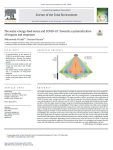Al-Saidi M., Hussein H. (2021). The water-energy-food nexus and COVID-19: towards a systematization of impacts and responses. Science of the Total Environment, 20/07/2021, vol. 779, p. 1-11.
https://doi.org/10.1016/j.scitotenv.2021.146529
https://doi.org/10.1016/j.scitotenv.2021.146529
| Titre : | The water-energy-food nexus and COVID-19: towards a systematization of impacts and responses (2021) |
| Auteurs : | M. Al-Saidi ; H. Hussein |
| Type de document : | Article |
| Dans : | Science of the Total Environment (vol. 779, 20 July 2021) |
| Article en page(s) : | p. 1-11 |
| Langues : | Anglais |
| Langues du résumé : | Anglais |
| Catégories : |
Catégories principales 08 - ALIMENTATION ; 8.3 - Politique et Sécurité AlimentaireThésaurus IAMM ALIMENTATION HUMAINE ; EAU ; APPROVISIONNEMENT EN EAU ; RESSOURCE EN EAU ; ENERGIE ; COVID-19 ; IMPACT SUR L'ENVIRONNEMENT ; SECURITE ALIMENTAIRE ; PROTECTION DE L'ENVIRONNEMENT ; DEVELOPPEMENT DURABLE ; MOYEN ORIENT |
| Résumé : | The COVID-19 pandemic offers an opportunity to examine the impacts of system-wide crises on key supply sectors such as water, energy and food. These sectors are becoming increasingly interlinked in environmental policy-making and with regard to achieving supply security. There is a pressing need for a systematization of impacts and responses beyond individual disruptions. This paper provides a holistic assessment of the implications of COVID-19 on the water–energy–food (WEF) nexus. First, it integrates the academic literature related to single cases and disruptions to provide a broader view of COVID-19 demand- and supply-side disruptions and immediate effects. Then, the major, long-term impact categories of medicalization/hygienization, (re)localization of production, and demand fluctuations are highlighted. These impacts result in priority cross-links such as irrigation, energy requirements for local food production, energy use for water and wastewater treatment, or water for energy use. Finally, sector-level insights on impacts and responses are provided, drawing from illustrative cases. The analysis of impacts of COVID-19 on the WEF nexus reflects heterogeneous experiences of short-term adaptations, and highlights the revaluation of the water–food–trade nexus. Revived debates on food sufficiency can benefit from green applications to minimize expected trade-offs. The current crisis also reveals some gaps in the WEF nexus debates with regard to the lack of risk-based perspectives and the need for a better consideration of spatial aspects in resource integration. Regarding resource-security issues in the WEF nexus, the COVID-19 stress test boosts debates concerning the adequacy of the production value chains (e.g., contingency and storage, diversification, and self-sufficiency) and the value of cross-border integration (e.g., trade, globalization, and aid). |
| Cote : | Réservé lecteur CIHEAM |
| URL / DOI : | https://doi.org/10.1016/j.scitotenv.2021.146529 |







